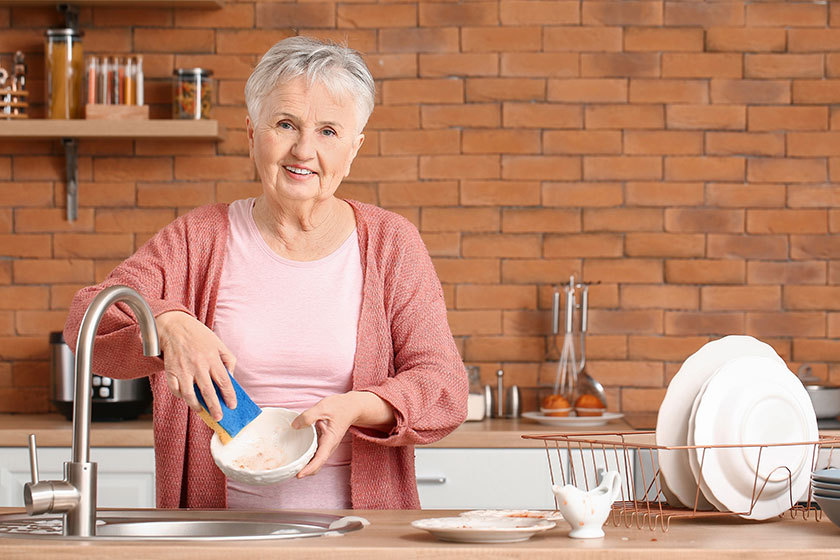Household chores may seem like mundane tasks to some, but they can serve as a highly beneficial and therapeutic activity for seniors. Beyond the immediate benefits of a tidy home, these activities help promote both mental and physical well-being. Engaging in everyday tasks offers a way for older adults to stay active and connected, fostering a sense of purpose and accomplishment.
Mental Health Benefits of Household Chores
Participating in household chores can be a therapeutic activity for the elderly as they stimulate brain activity and enhance cognitive functions. Tasks like cleaning, organizing, and even cooking can keep the mind sharp, helping older adults maintain memory, focus, and problem-solving skills. The mental engagement required for these chores offers regular exercise for the brain, which may help delay cognitive decline and reduce the risk of conditions like dementia.
In addition to cognitive benefits, household chores can also have a positive impact on emotional health. Completing a task, like folding laundry or washing dishes, can boost self-esteem and give a sense of accomplishment. This can be particularly important for older adults who may be dealing with feelings of sadness or sorrow. Participating in daily chores helps fill their day with structure and purpose, promoting emotional stability and satisfaction.
Physical Benefits of Household Chores
While household chores are often associated with cleaning, cooking, and organizing, they also offer physical benefits that help maintain mobility and overall fitness. Tasks like vacuuming, washing windows, or sweeping the floor encourage movement and light exercise. Regular engagement in these activities helps older adults stay physically active, improving flexibility, strength, and endurance.
Moreover, household chores create an opportunity for older adults to stay independent and avoid the sedentary lifestyle that often accompanies aging. By doing these tasks themselves, they can improve their motor skills and balance, which may reduce the risk of falls. Even simple activities, such as making the bed or watering plants, can contribute to physical wellness and keep muscles engaged.
Improved Social Connections through Household Chores
For older adults living with friends or family, household chores can also foster social connections. Sharing the responsibility of tasks with loved ones can lead to moments of bonding and interaction. If you plan of cooking a meal together or organizing a space, these tasks encourage collaboration and communication, helping your loved one feel more engaged and less isolated.
In households with multiple generations, involving older adults in chores creates opportunities for them to pass down valuable skills and traditions to younger family members. This exchange can enhance their sense of importance and legacy, making everyday tasks feel more meaningful. It also offers a great chance for your family to spend quality time together while completing necessary chores.
Chores as a Routine for Greater Mental Clarity
Another benefit of household chores is the structure they offer, helping older adults maintain a consistent daily routine. Having a set time each day for tasks like folding laundry, making the bed, or tidying up offers a sense of normalcy and order. For many older adults, sticking to a routine can reduce anxiety and feelings of confusion, promoting a clearer state of mind.
Incorporating regular chores into a day can also help maintain good sleep hygiene. The physical exertion from tasks such as washing dishes or cleaning surfaces may promote better sleep patterns, making it easier to fall asleep and stay asleep through the night. Regular physical activity, even in small doses, supports better overall health and contributes to greater well-being.
Household Chores as a Tool for Independence
Older adults often face the challenge of maintaining their independence as they age. Household chores can be a helpful tool for achieving this goal, as they allow your loved one to feel more self-reliant. Having the ability to manage simple tasks around the house can give them a sense of control over their environment, which is empowering and motivating.
By engaging in these tasks, older adults can retain their sense of autonomy and delay the need for outside assistance. Simple chores that promote independence, like organizing bookshelves or dusting furniture, help foster confidence. When older adults feel capable and in charge of their space, it has a positive effect on their overall outlook on life.
The Therapeutic Value of Household Chores for the Elderly
Taking part in household chores strengthens the sense of purpose of older adults and acts as a way to have valuable bonding opportunities with others. Household chores can nurture both physical and mental health, making them an important part of daily life for older adults. It is a simple yet effective method of enhancing overall quality of life, allowing your older loved one to feel engaged, happy, and fulfilled.







